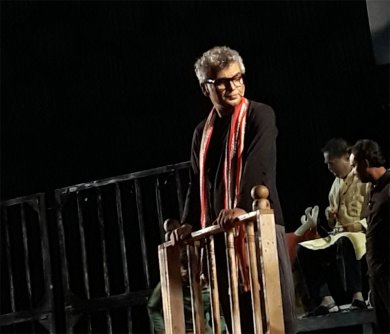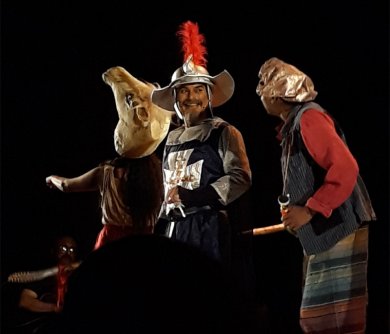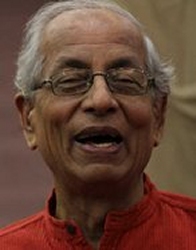
|   |

|   |
 e-mail: ukb7@rediffmail.com Masquerade of grandiose dreams Photos courtesy: Avishek Ghosh May 17, 2018 Miguel de Cervantes, belonging to the 16-17th century, was considered as the greatest litterateur of the Spanish language and one of the world's pre-eminent novelists. His masterpiece Don Quixote has been translated into more languages than any other book except the Bible and is considered as the first modern novel, a classic of Western literature and among the best works of fiction ever written. The story follows the adventures of a noble man who reads so many chivalrous romances that he loses his sanity and decides to set out to revive chivalry, undo wrongs, and bring justice to the world, under the name Don Quixote de la Mancha. He recruits a simple farmer, Sancho Panza, as his squire, who often employs a unique, earthy wit in dealing with Don Quixote's rhetorical orations on antiquated knighthood. Don Quixote does not see the world for what it is and prefers to imagine that he is living out a knightly story. Man of La Mancha, a 1964 musical by Dale Wasserman was inspired by Cervantes and his 17th century masterpiece Don Quixote and tells the same story of the "mad" knight Don Quixote as a "play within a play" performed by Cervantes and his fellow prisoners as he awaits a hearing with the Spanish Inquisition. 

Don: Taake Bhalo Laage performed by Chetana on April 30 in Kolkata, was a most enthralling adaptation of Man of La Mancha by the thespian Arun Mukhopadhyay into a Bengali version and the best part was that it retained the original musical operatic form of the Broadway hit. Directed by Sujan Mukhopadhyay, this was refreshingly different from the run-of-the-mill theatrical forms, practiced in India because all three main characters - Don Quixote, Sancho Panza and Don's ladylove Aldonza - - were eloquent, both singing songs and delivering dialogues. This is typical, of course, of the European opera post Richard Wagner where the principal dramatis personae are actors as well as singers - unlike the pre-Wagner opera where the characters sang their heart out but never delivered dialogues. Somehow, post-Wagner musical opera did not quite warm the cockles of the heart of India theatre-goers, with very rare exceptions of Marathi and Bengali folk plays. (Remarkably enough, Rabindranath Tagore - on return from England - penned two very successful Wagnerian opera in Bengali, Valmiki Pratibha and Kaal Mrigaya in 1881 and 1882 respectively, but never went back to this precise operatic form later in his long productive life). The current adapted version follows faithfully the La Mancha presentation style right from the word 'go.' It begins with the minor poet and playwright Subhamoy Dutta, the substitute for Cervantes, hauled on charges of sedition against the State, along with his associate Satyajit Mishra (in place of Sancho Panza). The masked prisoners, interned in the cage-like barracks, bay for blood, but on wiser counsel prevailing, settle for a mock trial. Subhamoy's script for "a play within play" is enacted enthusiastically by the jail inmates, with the bespectacled Subhamoy appearing and re-appearing from time to time with almost Brechtian "alienation effect". La Mancha's cabin trunk, carrying Quixote's apparels and other theatrical bric-a-brac, also finds a place in the Kolkata adaptation. But, for some reason, the adaptation recalls throughout the original Spanish story - complete with its connotations of Quixote's "knighthood", the windmills mistaken for armed demons, the public bar mistaken for a fortress and its "resident sex-worker" Aldonza wooed by Quixote as his "gorgeous ladylove" - although these archaic symbols of the medieval West do not ring a bell for the Indian spectators. In spite of the temerity of the adaptation in not going the whole hog Indian, Donů proceeds very well on the strengths of its protagonists, namely, the histrionic prowess of Suman Mukhopadhyay as Subhamoy Dutta / Don Quixote, Nibedita Mukhopadhyay as Aldonza / Alienza and Satish Shaw as Sancho Panza / Satyajit Mishra, by both singing ecstatically their lyrics and verbalizing superbly their dialogues in the true spirit of an opera. A word must be reserved on the opera's rich musical texture, drawing liberally from flamenco, rock-n-roll and western classical music at one end and Keertan, Tappa and Rabindra sangeet at the other end, making the whole opera become an original musical tapestry - with all thanks due to the live musical support present on the proscenium - - and a sumptuous treat to the eyes and ears of the viewers.
Here is a minor word - almost as an affectionate admonition! - for the young, enterprising director Sujan Mukhopadhyay. Don Quixote is too well known in the literary annals as "a peddler of absurd dreams" to sound otherwise, without the remotest connection with reality, which is what makes his character so endearing both to the cognoscente and to the hoi polloi. There was no need to load his "dialogues" and "musical perorations" sound like "sermonizing' on our land's current socio-economic ills, howsoever urgent they are, for, then Donů loses the capriciousness of his quixotic dreams, precisely what make him so charming and utterly delightful to the wide open world.  Dr. Utpal K Banerjee is a scholar-commentator on performing arts over last four decades. He has authored 23 books on Indian art and culture, and 10 on Tagore studies. He served IGNCA as National Project Director, was a Tagore Research Scholar and is recipient of Padma Shri. Post your comments Please provide your name and email id when you use the Anonymous profile in the blog to post a comment. All appropriate comments posted with name & email id in the blog will also be featured in the site. |